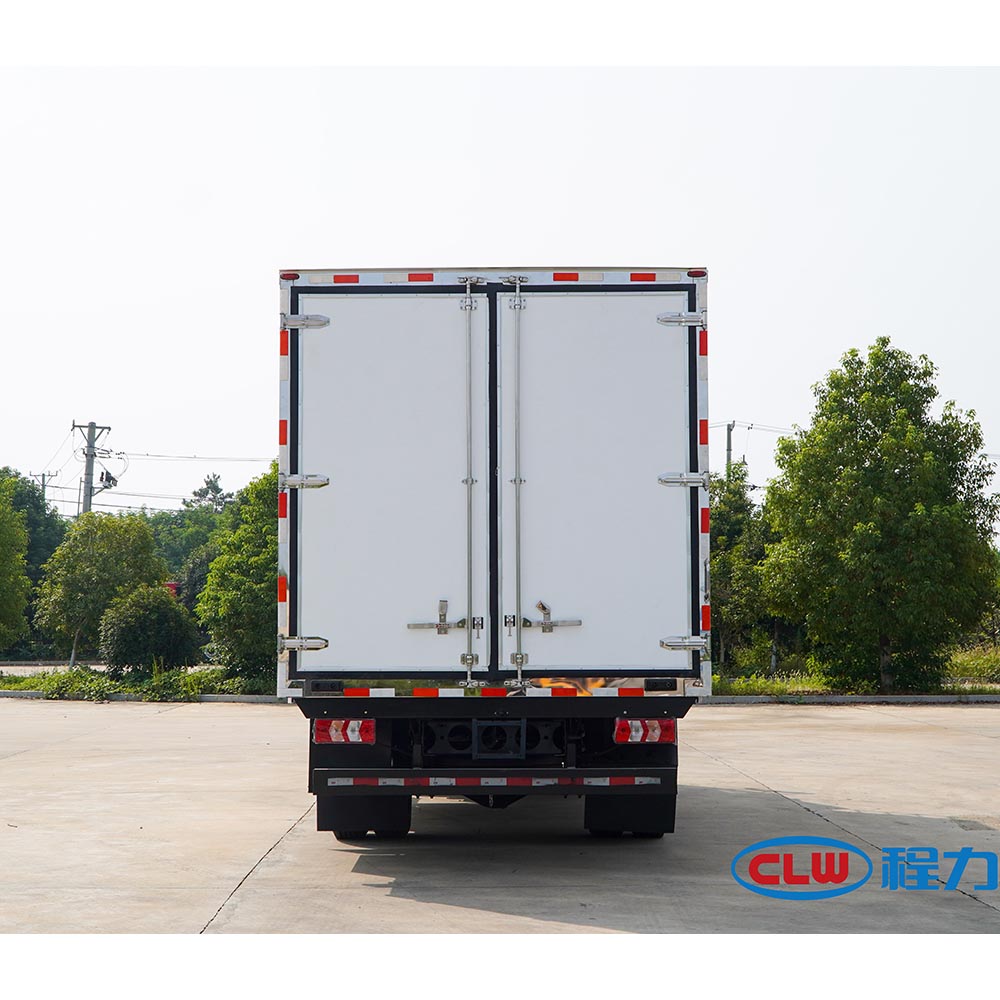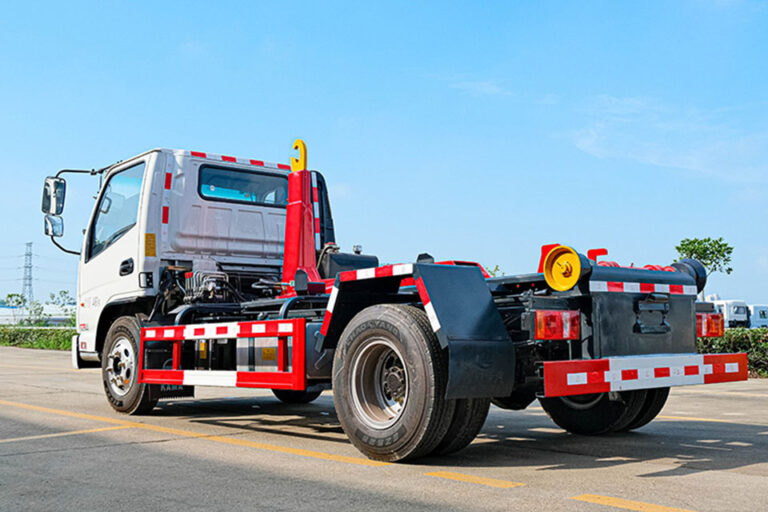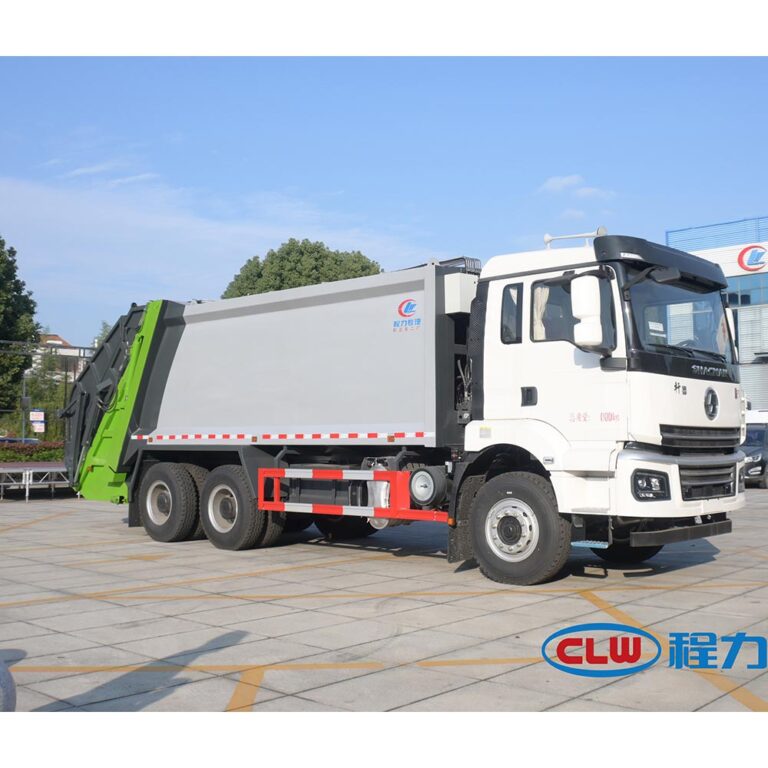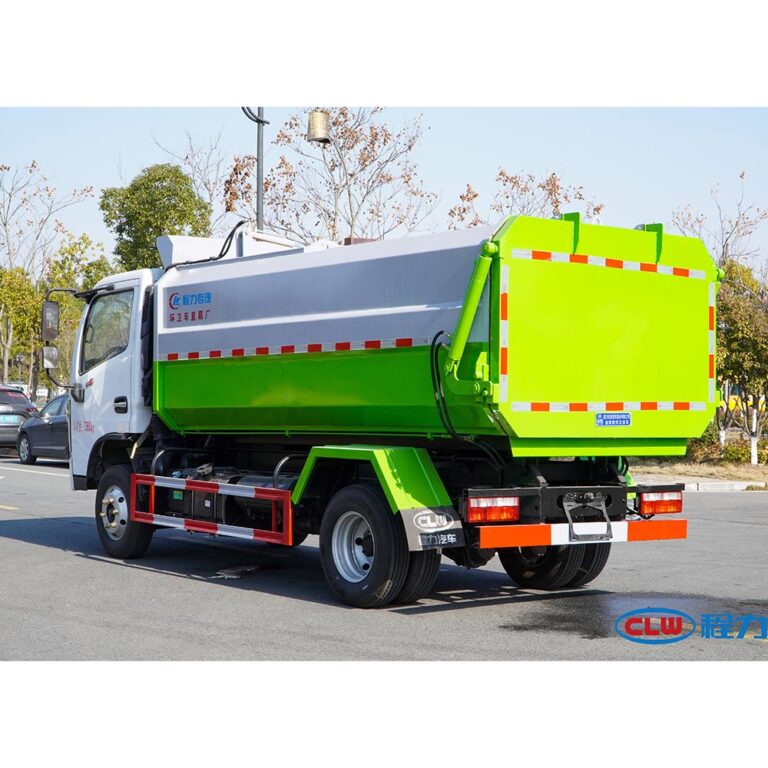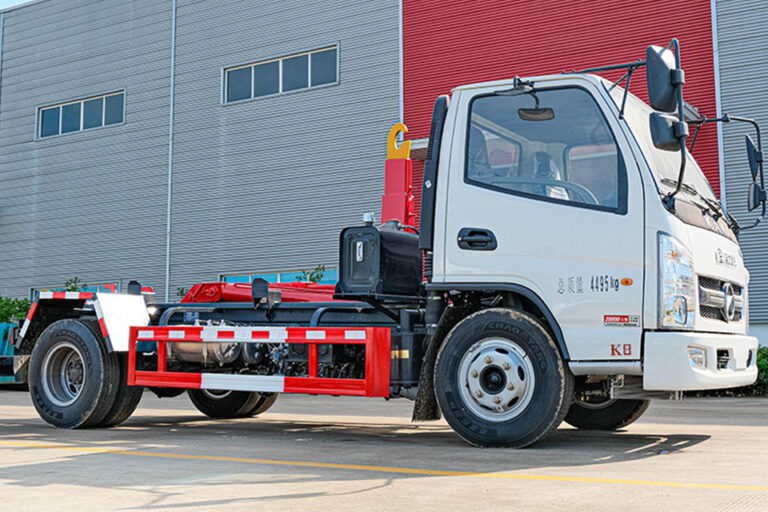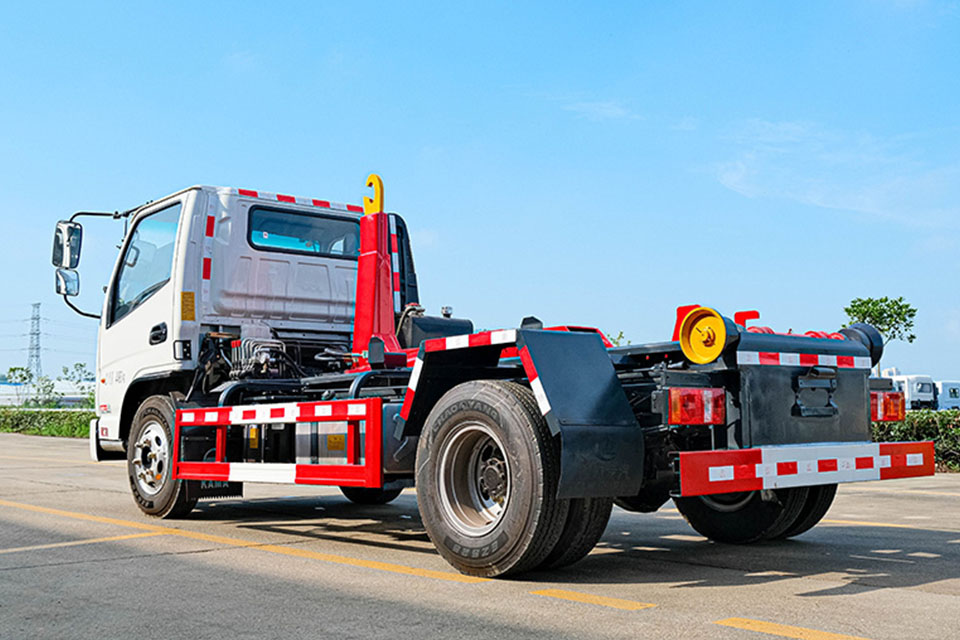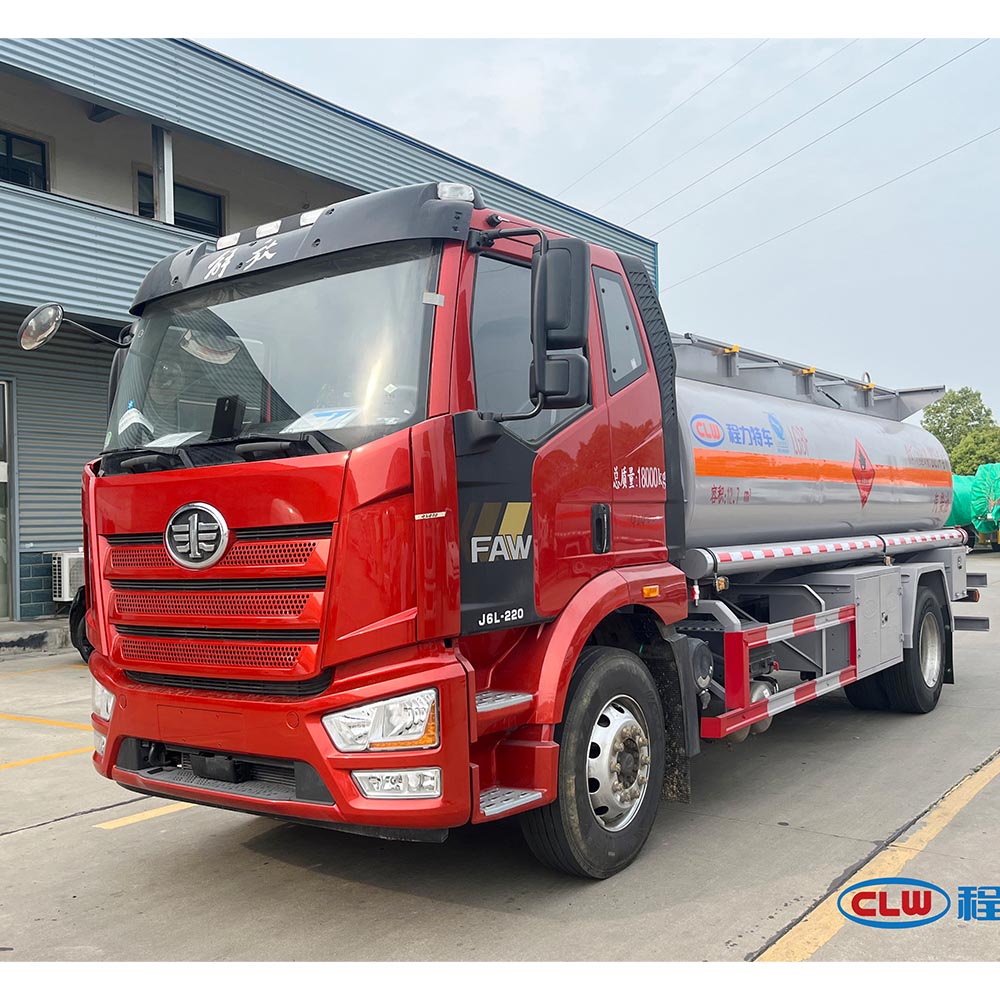-
مجمع تشنغلي الصناعي للسيارات
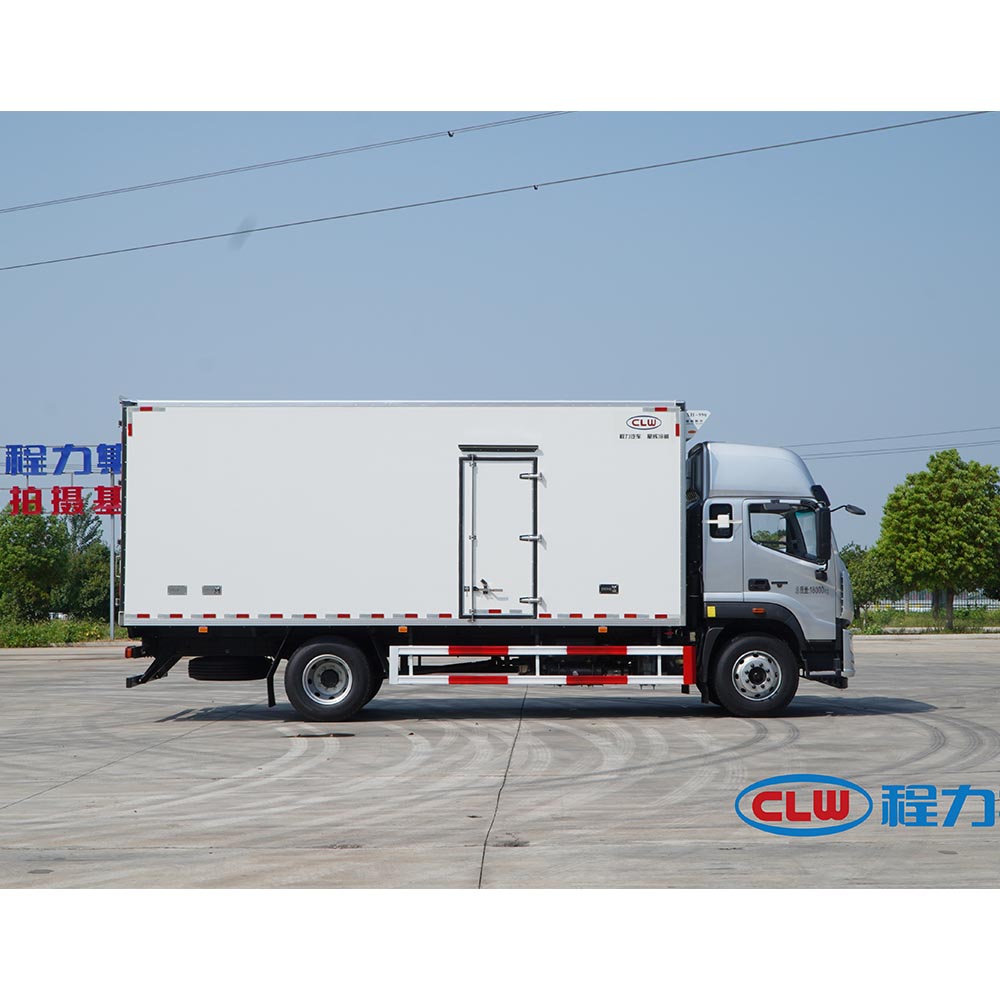
ما هي الشاحنة المبردة
الشحن بالشاحنات المبردة 101: كل ما تحتاج إلى معرفته عن الشحن المبرد
يغوص هذا المقال في عالم المبرد النقل بالشاحنات، وهو جزء حيوي من صناعة النقل الذي يضمن التسليم الآمن والفعال للبضائع الحساسة للحرارة. بصفتنا شركة رائدة في شاحنة تبريد الشركة المصنعة، أتفهم تعقيدات هذه الصناعة. سواء كنت معالجاً للأغذية أو موزعاً للأدوية أو بائع زهور، فإن فهم المبرد التكنولوجيا أمر بالغ الأهمية لعملك. سيقدم هذا الدليل نظرة عامة شاملة عن الشاحنات والمقطورات المبردةويغطي كل شيء بدءًا من تطورها التاريخي إلى تعقيدات تشغيلها، مما يجعلها موردًا قيمًا لأي شخص يعمل في مجال لوجستيات سلسلة التبريد. إذا كنت تتطلع إلى تحسين سلسلة التوريد الخاصة بك من خلال التحكم الموثوق في درجة الحرارة، فإن هذه القراءة تستحق وقتك.
جدول المحتويات
ما هي الوحدة المبردة وكيف تعمل الوحدة المبردة؟
"المبرد" هو مصطلح مختصر لمصطلح شاحنة تبريد أو مقطورةمصممة لنقل السلع القابلة للتلف التي تتطلب التحكم في درجة الحرارة. A المبرد هو في الأساس متحرك التبريد نظام قادر على الحفاظ على درجة الحرارة المحددة طوال الرحلة. ولكن كيف يحقق ذلك؟
قلب المبرد هو وحدة التبريدوالمعروف أيضًا باسم وحدة التبريد. يستخدم هذا النظام المعقد نظام التبريد التي تعتمد على مبادئ التبادل الحراري. تعمل عن طريق تدوير سائل التبريد السائلالتي تمتص الحرارة من داخل المقطورة. ثم يتم طرد هذه الحرارة الممتصة إلى الخارج، مع الحفاظ على نطاق درجة الحرارة داخل المقطورة. يتيح ذلك الشاحنات المبردة لنقل كل شيء من المنتجات الطازجة و الطعام المجمد إلى المستحضرات الصيدلانية المنتجات، مما يضمن وصولها إلى وجهتها في حالة مثالية. إن وحدة التبريد القدرة على الحفاظ على درجة حرارة ثابتة هو ما يجعل النقل بالشاحنات المبردة ضروري لـ المنتجات الحساسة للحرارة.
تعمل وحدات التبريد المبردة على غرار مكيف الهواء المنزلي، ولكن على نطاق أوسع بكثير. تتضمن العملية ضغط المبرد الغازيمما يؤدي إلى تسخينه. ثم يمر عبر مكثف حيث يبرد ويصبح سائلاً. هذا سائل التبريد السائل يمر من خلال صمام القياس ويتم رشها في لفائف المبخر الموجودة في داخل المقطورة. عندما يتبخر غاز التبريد، فإنه يمتص الحرارة من الهواء داخل المقطورةمما يتسبب في انخفاض درجة الحرارة. يعود غاز التبريد الدافئ إلى الضاغط، وتتكرر الدورة. من المهم ملاحظة ما يلي وحدات التبريد مصممة ليس فقط لتبريد الهواء، ولكن أيضًا للتحكم في الرطوبة وتدفق الهواء، وهما أمران ضروريان للحفاظ على جودة أنواع مختلفة من البضائع.
ما هو تاريخ الشاحنات المبردة؟
إن تاريخ الشاحنات المبردة هي رحلة رائعة من الابتكار، مدفوعة بالحاجة إلى نقل السلع القابلة للتلف لمسافات طويلة. في الأيام الأولى من القرن العشرين، استُخدم الثلج للحفاظ على برودة البضائع أثناء النقل. ومع ذلك، كانت هذه الطريقة غير موثوقة وغير فعالة.
اختراع الميكانيكية التبريد أحدثت ثورة في هذه الصناعة. أول الشاحنات المبردة ظهرت في ثلاثينيات القرن العشرين، باستخدام أجهزة ضخمة وغير فعالة نسبيًا التبريد الأنظمة. على مدى عقود، أدى التقدم في التكنولوجيا إلى زيادة إحكام وفعالية وحدات التبريد. اليوم, الشاحنات والمقطورات المبردة مجهزة بأنظمة متطورة لمراقبة درجات الحرارة والتحكم فيها، مما يضمن النقل الآمن من حساس للحرارة الشحنات عبر القارات، والحفاظ على سلامة سلسلة التبريد. تطور النقل المبرد يعكس دفعًا مستمرًا نحو الكفاءة والموثوقية والدقة في إدارة درجات الحرارة، وهو أمر بالغ الأهمية للصناعات التي تتعامل مع السلع الحساسة والقيّمة.
ما هي الأجزاء الرئيسية للمقطورة المبردة؟
فهم أجزاء المقطورة المبردة أمر بالغ الأهمية لتقدير مدى تعقيد هذه المركبات. A مقطورة مبردة تتكون من عدة مكونات رئيسية، يلعب كل منها دورًا حيويًا في الحفاظ على درجة الحرارة المطلوبة.
- صندوق معزول: الجسم الرئيسي لـ مقطورة بكثافة معزول لمنع تقلبات درجات الحرارة وتقليل عبء العمل على وحدة التبريد.
- وحدة المبردات: تقع في الجزء الأمامي من مقطورةفهو يضم الضاغط والمكثف والمبخر ولوحة التحكم.
- خزان الوقود: تزويد الوقود لـ وحدة التبريدمما يضمن قدرته على العمل بشكل مستقل عن الشاحنة المحرك
- مزلق هوائي: يوزع الهواء البارد بالتساوي في جميع أنحاء مقطورةمنع البقع الساخنة.
- مستشعرات درجة الحرارة: مراقبة درجة الحرارة داخل المقطورة وتقديم ملاحظات إلى وحدة التبريد.
- لوحة التحكم: يسمح ل سائق مُبرِّد لضبط وتعديل الإحداثيات المرغوبة درجة الحرارة ومراقبة أداء النظام.
تعمل هذه المكونات معًا لإنشاء التحكم في درجة الحرارة البيئة، وحماية الشحنة أثناء النقل. يعد الفهم العميق لكيفية تفاعل هذه الأجزاء أمرًا ضروريًا لأي شخص يشارك في النقل بالشاحنات المبردةمن السائقين إلى أطقم الصيانة
كيف تختلف شاحنات التبريد عن الشاحنات الجافة؟
الفرق الأساسي بين الشاحنات المبردة و الشاحنات الجافة تكمن في قدرتها على تنظيم درجة الحرارة. الشاحنات الجافة هي في الأساس مقطورات مغلقة مصممة لحماية الشحنة من العناصر، لكنها تفتقر إلى التحكم في درجة الحرارة الإمكانيات. وهي مناسبة للنقل السلع الجافة التي ليست حساس للحرارة.
الشاحنات المبردة، من ناحية أخرى، تم تجهيزها بأجهزة متطورة وحدات التبريد التي يمكن أن تحافظ على نطاق درجة الحرارةمن التجميد العميق إلى المحيط. وهذا يجعلها مثالية للنقل قابل للتلف و السلع الحساسة للحرارة مثل السلع المجمدة, المنتجات الطازجة, المستحضرات الصيدلانيةوالمواد الكيميائية قدرة الشاحنة للحفاظ على درجة الحرارة المحددة هو عامل التمايز الرئيسي. العديد من الناقلات المبردة السحب الجاف الشحن أيضًا لتحقيق أقصى استفادة من معداتهم. ويقومون بذلك عن طريق إيقاف تشغيل وحدة التبريد عند السحب الشحن بالشاحنات الجافة. في حين أن المقطورات المبردة تُستخدم أيضًا في السحب الجاف الشحن, جاف تقليدي لا يمكن للشاحنات الصغيرة استخدام المبرد الشحن.
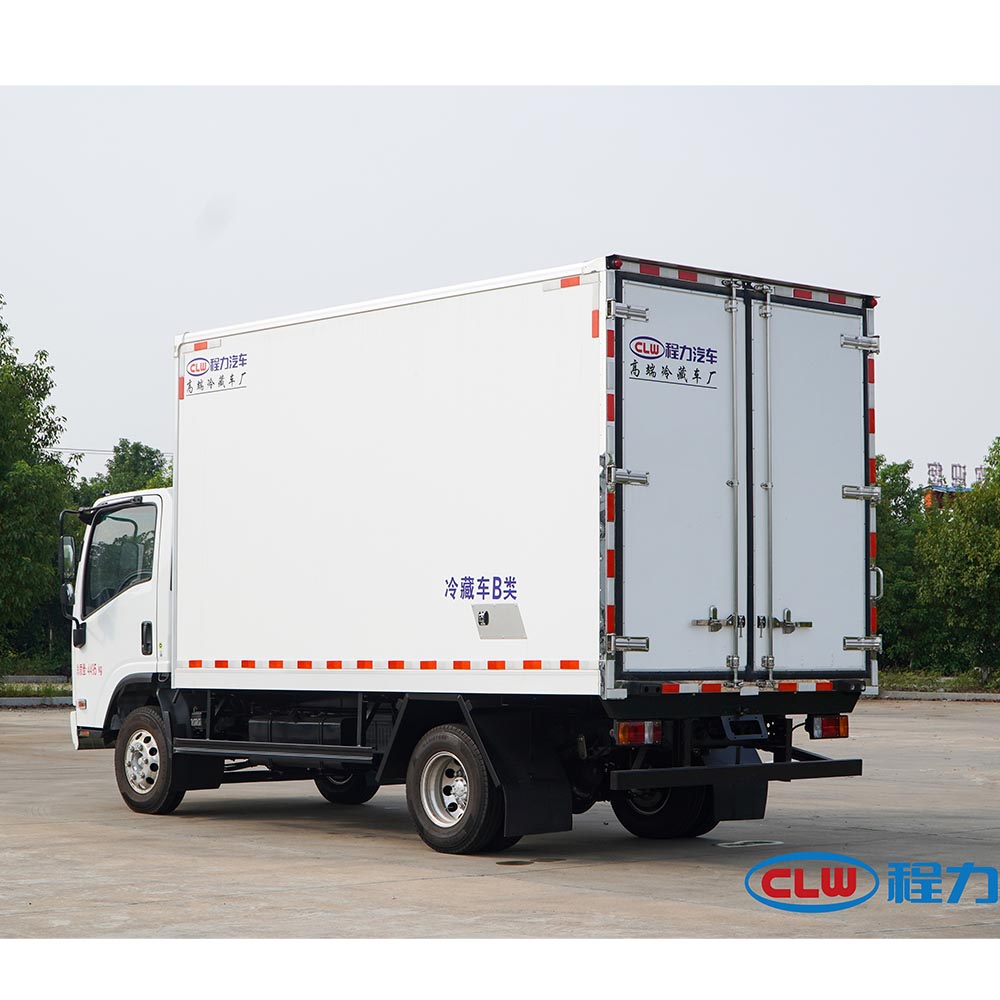
ما أنواع الشركات التي تعتمد على الشاحنات والمقطورات المبردة؟
الشاحنات والمقطورات المبردة ضرورية لمجموعة واسعة من الصناعات التي تتعامل مع المنتجات الحساسة للحرارة. فيما يلي تفصيل لبعض القطاعات الرئيسية:
- صناعة الأغذية:
- مجهزو ومصنعو الأغذية: نقل المواد الخام والمنتجات النهائية مثل اللحوم والألبان والأطعمة المجمدة.
- موزعو الأغذية وتجار الجملة: توصيل السلع الطازجة والمجمدة إلى تجار التجزئة ومقدمي الخدمات الغذائية.
- متاجر البقالة والسوبر ماركت: ضمان توفير إمدادات ثابتة من المنتجات الطازجة ومنتجات الألبان والمواد المجمدة.
- المطاعم ومقدمو خدمات الطعام: استلام المكونات والوجبات المحضرة في درجة الحرارة الصحيحة.
- شركات تقديم الطعام: نقل الطعام إلى الفعاليات مع الحفاظ على معايير السلامة الغذائية.
- خدمات توصيل الوجبات: توصيل المكونات الطازجة مباشرةً إلى المستهلكين.
- صناعة المستحضرات الصيدلانية:
- الشركات المصنعة للأدوية: نقل الأدوية واللقاحات الحساسة للحرارة.
- موزعو المستحضرات الصيدلانية: توصيل المنتجات الصيدلانية إلى الصيدليات والمستشفيات.
- الصيدليات: استلام الأدوية التي يتم التحكم في درجة حرارتها وتخزينها.
- المستشفيات والعيادات: ضمان النقل والتخزين الآمنين للأدوية والدم والعينات البيولوجية الأخرى.
- المؤسسات البحثية: نقل وتخزين العينات والمواد البحثية الحساسة لدرجات الحرارة وتخزينها.
- صناعة الزهور:
- مزارعو الزهور والمزارع: نقل الزهور المقطوفة حديثاً إلى تجار الجملة وتجار التجزئة.
- بائعو الزهور بالجملة: توصيل الزهور إلى بائعي الزهور وتجار التجزئة الآخرين.
- بائعو الزهور: استلام الزهور وتخزينها في درجة الحرارة المثلى.
- الصناعة الكيميائية:
- الشركات المصنعة للمواد الكيميائية: نقل المواد الكيميائية والمواد الخام الحساسة لدرجات الحرارة.
- موزعو المواد الكيميائية المتخصصة: توفير المواد الكيميائية لمختلف الصناعات مع الحفاظ على استقرارها.
- الخدمات اللوجستية والنقل:
- شركات التوصيل في الميل الأخير: توصيل السلع الحساسة للحرارة مباشرةً إلى المستهلكين.
- مقدمو الخدمات اللوجستية لسلسلة التبريد: تقديم خدمات نقل متخصصة للمنتجات الحساسة للحرارة.
- 3PLs (مزودو الخدمات اللوجستية من الطرف الثالث): إدارة سلاسل التوريد المعقدة التي تتضمن النقل المبرد.
بالنسبة لهذه الصناعات, النقل بالشاحنات المبردة ليست مجرد وسيلة مريحة، بل هي ضرورة لضمان جودة المنتج وسلامته وامتثاله للوائح التنظيمية.
ما هو دور سائق النقل المبرد في سلسلة التوريد؟
إن سائق مُبرِّد دورًا حاسمًا في سلسلة التبريدحيث تعمل كحلقة وصل حيوية بين المنتجين والموزعين والمستهلكين. فهم مسؤولون ليس فقط عن قيادة الشاحنة ولكن أيضًا للتأكد من أن الشحنة يتم الاحتفاظ بها في درجة الحرارة الصحيحة طوال الرحلة.
A سائق الشاحنة المبردة يجب أن يكون على دراية بتشغيل وحدة التبريد وقادرين على مراقبة درجة الحرارة وضبطها حسب الحاجة. كما يجب أن يكونوا على دراية بما يلي سلامة الأغذية اللوائح التنظيمية وأفضل الممارسات للتعامل مع السلع الحساسة للحرارة. سائقو المبردات غالبًا ما تحتاج إلى استكشاف المشكلات وإصلاحها مع وحدة التبريد واتخاذ قرارات لحماية الحمولة بالكامل في حالة حدوث أعطال. يتطلب هذا الدور مستوى عالٍ من المسؤولية والاهتمام بالتفاصيل، لأن أي أخطاء قد تؤدي إلى خسائر كبيرة ومخاطر صحية محتملة، لأن الحمولة المبردة قيّمة للغاية.
ما هي الجوانب الرئيسية لسلامة الأغذية في النقل بالشاحنات المبردة؟
سلامة الأغذية أمر بالغ الأهمية في النقل بالشاحنات المبردةلأنها تؤثر بشكل مباشر على الصحة العامة. الحفاظ على درجة الحرارة الصحيحة أمر بالغ الأهمية لمنع نمو البكتيريا الضارة التي يمكن أن تسبب الأمراض المنقولة بالغذاء.
الجوانب الرئيسية لـ سلامة الأغذية في النقل المبرد تشمل:
- مراقبة درجة الحرارة: مراقبة درجة الحرارة باستمرار داخل المقطورة لضمان بقائها ضمن النطاق الآمن.
- دوران الهواء المناسب: التأكد من أن الهواء البارد يدور بالتساوي في جميع أنحاء مقطورة لمنع البقع الساخنة.
- الصرف الصحي: التنظيف والتعقيم المنتظمين مقطورة لمنع التلوث التبادلي.
- التبريد المسبق: تبريد مقطورة إلى درجة الحرارة المطلوبة قبل التحميل لتقليل تقلبات درجات الحرارة.
- التحميل المناسب: تجنب التحميل الزائد وضمان التباعد المناسب بين المنصات لتحقيق التدفق الأمثل للهواء.
- حفظ السجلات: الاحتفاظ بسجلات مفصلة لقراءات درجات الحرارة وأي انحرافات.
يعد الالتزام بهذه الممارسات أمرًا ضروريًا لضمان النقل الآمن من السلع القابلة للتلف والامتثال لـ سلامة الأغذية اللوائح.
كيف يؤثر قانون تحديث سلامة الأغذية على النقل المبرد؟
إن قانون تحديث سلامة الأغذية (FSMA)الذي تم سنه في عام 2011، أثر بشكل كبير على صناعة النقل بالشاحناتلا سيما النقل بالشاحنات المبردة. يهدف قانون سلامة الأغذية والأدوية الغذائية إلى الوقاية من الأمراض المنقولة بالأغذية عن طريق تحويل التركيز من الاستجابة للتلوث إلى الوقاية منه.
بالنسبة لـ المبرد النقل، أدخلت FSMA قاعدة النقل الصحي للأغذية البشرية والحيوانية، والتي تحدد متطلبات المركبات وعمليات النقل لضمان النقل الآمن من الطعام. تشمل الأحكام الرئيسية ما يلي:
- معايير المركبات والمعدات: المقطورات المبردة يجب تصميمها وصيانتها لمنع الطعام من أن يصبح غير آمن أثناء النقل.
- التحكم في درجة الحرارة: يجب على شركات النقل إثبات قدرتها على الحفاظ على درجة الحرارة المطلوبة لمنتجات غذائية محددة.
- حفظ السجلات: يجب على شركات النقل الاحتفاظ بسجلات مراقبة درجة الحرارة والتنظيف والمعلومات الأخرى ذات الصلة.
- التدريب: الموظفون المشاركون في النقل المبرد يجب أن يتلقى تدريبًا على ممارسات النقل الصحي.
يعد الامتثال لقانون سلامة الأغذية والأدوية الغذائية أمرًا بالغ الأهمية لما يلي الناقلات المبردة لتجنب العقوبات وضمان سلامة الإمدادات الغذائية.
ما الذي يجب أن تضعه في اعتبارك عندما تصبح سائق شاحنة نقل مبردة؟
أن تصبح سائق شاحنة تبريد يمكن أن يكون مساراً مهنياً مجزياً، ولكنه يتطلب مهارات ومعرفة محددة. وفيما يلي بعض الاعتبارات الرئيسية:
- رخصة القيادة التجارية (CDL): ستحتاج إلى رخصة قيادة CDL من الفئة A لتشغيل سيارة الشاحنة مع مقطورة.
- تشغيل وحدة المبردات: تعرّف على عملية تشغيل وصيانة وحدات التبريد.
- مراقبة درجة الحرارة: تعلّم كيفية مراقبة درجة الحرارة وضبطها داخل مقطورة.
- لوائح سلامة الأغذية: فهم سلامة الأغذية اللوائح التنظيمية وأفضل الممارسات للتعامل مع السلع الحساسة للحرارة.
- مهارات حل المشكلات: كن مستعدًا لاستكشاف المشكلات وإصلاحها مع وحدة التبريد واتخاذ قرارات لحماية الحمولة.
- المتطلبات البدنية: المبرد قد تتطلب القيادة جهدًا بدنيًا كبيرًا، حيث تتطلب ساعات طويلة على الطريق وأحيانًا المساعدة في التحميل والتفريغ.
- مهارات التواصل: التواصل الفعال مع المرسلين والشاحنين والمستلمين لضمان سلاسة العمليات.
إذا كنت تفكر في العمل في مهنة سائق الشاحنة المبردة، فمن الضروري الموازنة بين هذه العوامل والاستثمار في التدريب والإعداد اللازمين.
ما الذي ينطوي عليه التحميل والتفريغ السليم للمقطورات المبردة؟
التحميل والتفريغ a مقطورة مبردة يتطلب تخطيطًا وتنفيذًا دقيقين للحفاظ على سلامة سلسلة التبريد. إليك دليل تفصيلي خطوة بخطوة:
- التبريد المسبق: قبل التحميل، تأكد من أن مقطورة يتم تبريده مسبقًا إلى درجة الحرارة المطلوبة. يساعد ذلك في تقليل تقلبات درجات الحرارة عند فتح الأبواب. يمكنك الاتصال بنا إذا كانت لديك أي شكوك حول علامة تشنغلي التجارية - مركبة نقل معدات التفجير - تشنجلي.
- الفحص: افحص مقطورة لأي تلف أو حطام يمكن أن يؤثر على التحكم في درجة الحرارة أو تلوث الشحنة.
- التدريج: تنظيم الشحنة للتحميل الفعال، وتجميع العناصر ذات متطلبات درجة الحرارة المتشابهة معًا.
- يتم التحميل:
- قم بالتحميل بسرعة وكفاءة لتقليل وقت فتح الأبواب.
- تجنب التحميل الزائد على مقطورة، حيث يمكن أن يؤدي ذلك إلى تقييد تدفق الهواء.
- تأكد من وجود مسافات مناسبة بين المنصات للسماح بدوران الهواء الكافي.
- ضع الأغراض الحساسة للحرارة بعيداً عن الأبواب، حيث تكون التقلبات في درجات الحرارة أكثر احتمالاً.
- مراقبة درجة الحرارة: بمجرد التحميل، راقب درجة الحرارة عن كثب للتأكد من بقائها ضمن النطاق المطلوب. استخدام الشاحنة المبردة المتطورة من JAC سيساعدك في هذا الأمر.
- التفريغ:
- قم بتفريغ الحمولة بسرعة وكفاءة، مما يقلل من وقت فتح الأبواب.
- تحقق من درجة حرارة الشحنة عند الاستلام.
- افحص الشحنة لأي علامات تلف أو تلف.
- التنظيف: بعد التفريغ، قم بتنظيف وتعقيم مقطورة لمنع التلوث التبادلي وإعداده لـ الحمولة التالية.
مناسب التحميل والتفريغ الممارسات ضرورية للحفاظ على سلامة الأغذية وضمان جودة السلع الحساسة للحرارة. للمساعدة في الشاحنات المبردة، لا تتردد في الاتصال بنا. شاحنة تبريد عالية الجودة.
الأسئلة الشائعة
ما هو نطاق درجة الحرارة النموذجي للمقطورة المبردة؟
النموذجية نطاق درجة الحرارة لـ مقطورة مبردة تتراوح بين -20 درجة فهرنهايت (-29 درجة مئوية) و70 درجة فهرنهايت (21 درجة مئوية)، على الرغم من أن بعض الوحدات المتخصصة يمكن أن تنخفض أكثر من ذلك. تعتمد درجة الحرارة المحددة على نوع الشحنة يتم نقلها.
هل يمكن استخدام المقطورات المبردة لنقل البضائع الجافة؟
نعم, المقطورات المبردة يمكن استخدامها لنقل السلع الجافة ببساطة عن طريق إيقاف تشغيل وحدة التبريد. ومع ذلك، من المهم التأكد من أن مقطورة نظيفًا وخاليًا من أي روائح من الحمولة السابقة. إذا كنت ترغب في شراء شاحنة تبريد، يُرجى الاتصال بنا.
كم مرة يجب صيانة وحدة التبريد؟
A وحدة التبريد يجب أن تتم صيانتها بانتظام، عادةً كل 1500 إلى 3000 ساعة تشغيل، أو حسب توصية الشركة المصنعة. تساعد الصيانة المنتظمة على منع الأعطال وتضمن الأداء الأمثل.
ما هي عواقب تعطل وحدة التبريد أثناء النقل؟
A وحدة التبريد يمكن أن يكون للفشل عواقب وخيمة، بما في ذلك تلف الشحنةوالخسائر المالية والمخاطر الصحية المحتملة في حالة الشحنة هو الطعام أو المستحضرات الصيدلانية المنتجات. من الضروري وجود خطط طوارئ في حالة وقوع مثل هذا الحدث. على سبيل المثال شاحنة فوتون أومان عالية السقف مزدوجة النوم مبردة سيساعدك كثيراً
ما هو وضع التشغيل المستمر في وحدة التبريد؟
وضع التشغيل المستمر يعني أن وضع التشغيل المستمر يعني أن وحدة التبريد يعمل باستمرار للحفاظ على درجة حرارة دقيقة، بغض النظر عما إذا كان الثرموستات يستدعي التبريد أم لا. غالباً ما يستخدم هذا الوضع في الشحنة حساس للغاية تجاه تقلبات درجات الحرارةمثل بعض المستحضرات الصيدلانية المنتجات. يمكنك الاتصال بنا إذا كنت مهتمًا بـ الشاحنات المبردة.
هل تحتاج جميع الشاحنات المبردة إلى التوقف في محطات الوزن؟
ما إذا كان شاحنة تبريد في محطات الوزن يعتمد على معدل الوزن الإجمالي للمركبة (GVWR) ولوائح الولاية. بشكل عام، يُطلب من المركبات التي يبلغ معدل الوزن الإجمالي للمركبة (GVWR) 10,001 رطل أو أكثر التوقف في محطات الوزن. من المهم أن يكون السائقون على دراية بالمتطلبات المحددة في كل ولاية يسافرون عبرها. لمزيد من المعلومات حول شراء الشاحنات المبردة، يُرجى الاتصال بنا.
الخاتمة
إليك أهم الأشياء التي يجب أن تتذكرها النقل بالشاحنات المبردة:
- الشاحنات المبردة ضرورية لنقل السلع الحساسة للحرارة بأمان وكفاءة.
- الوحدات المبردة تعمل عن طريق تدوير المبرد لامتصاص الحرارة وطردها، والحفاظ على درجة حرارة ثابتة داخل المقطورة.
- سلامة الأغذية أمر بالغ الأهمية في النقل بالشاحنات المبردةوالالتزام الصارم بممارسات التحكم في درجة الحرارة والتعقيم أمر بالغ الأهمية.
- إن قانون تحديث سلامة الأغذية (FSMA) لوائح جديدة لـ النقل المبردالتركيز على الوقاية من الأمراض المنقولة بالأغذية.
- سائقو المبردات دورًا حاسمًا في سلسلة التبريدتتطلب معرفة ومهارات متخصصة.
- مناسب التحميل والتفريغ الممارسات ضرورية لتقليل تقلبات درجات الحرارة والحفاظ على جودة المنتج.
- المقطورات المبردة متعددة الاستخدامات ويمكن استخدامها في كل من مبرد و الشحن الجاف.
- فهم الاختلافات بين الشاحنات المبردة و الشاحنات الجافة أمر بالغ الأهمية لاختيار المعدات المناسبة لاحتياجات النقل الخاصة بك.
- تعتمد العديد من الصناعات على الشاحنات المبردةبما في ذلك الطعام, المستحضرات الصيدلانيةوالزهور والقطاعات الكيميائية.
- أن تصبح سائق مبردة تتطلب رخصة قيادة CDL، ومعرفة بـ وحدة التبريد العملية، والالتزام ب سلامة الأغذية.
بصفتك شاحنة تبريد الشركة المصنعة، لقد شهدت عن كثب الدور الحاسم الذي تلعبه هذه المركبات في مختلف الصناعات. بدءًا من ضمان نضارة منتجاتك الصباحية من خلال شاحنة نقل المعدات المتفجرة لتوصيل الأدوية المنقذة للحياة الشاحنات المبردة هم الأبطال المجهولون في سلسلة التوريد الحديثة. إذا كنت منخرطًا في أي صناعة تتطلب التحكم في درجة الحرارة النقل، وفهم تعقيدات النقل بالشاحنات المبردة ليست مفيدة فحسب، بل ضرورية. دعونا نعمل معًا للحفاظ على سلسلة التبريد قوية وضمان التسليم الآمن والفعال للبضائع في جميع أنحاء العالم. يرجى عدم التردد في الاتصال بنا.
